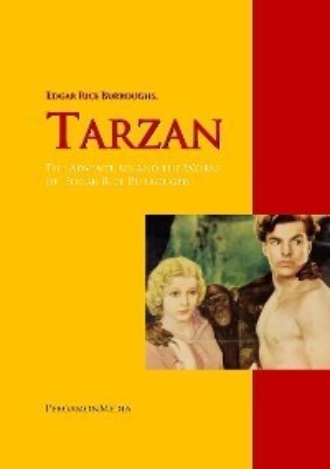
Полная версия
Tarzan: The Adventures and the Works of Edgar Rice Burroughs
He could not swim, and the water was very deep; but still he lost no particle of that self-confidence and resourcefulness which were the badges of his superior being.
Rapidly he moved his hands and feet in an attempt to scramble upward, and, possibly more by chance than design, he fell into the stroke that a dog uses when swimming, so that within a few seconds his nose was above water and he found that he could keep it there by continuing his strokes, and also make progress through the water.
He was much surprised and pleased with this new acquirement which had been so suddenly thrust upon him, but he had no time for thinking much upon it.
He was now swimming parallel to the bank and there he saw the cruel beast that would have seized him crouching upon the still form of his little playmate.
The lioness was intently watching Tarzan, evidently expecting him to return to shore, but this the boy had no intention of doing.
Instead he raised his voice in the call of distress common to his tribe, adding to it the warning which would prevent would-be rescuers from running into the clutches of Sabor.
Almost immediately there came an answer from the distance, and presently forty or fifty great apes swung rapidly and majestically through the trees toward the scene of tragedy.
In the lead was Kala, for she had recognized the tones of her best beloved, and with her was the mother of the little ape who lay dead beneath cruel Sabor.
Though more powerful and better equipped for fighting than the apes, the lioness had no desire to meet these enraged adults, and with a snarl of hatred she sprang quickly into the brush and disappeared.
Tarzan now swam to shore and clambered quickly upon dry land. The feeling of freshness and exhilaration which the cool waters had imparted to him, filled his little being with grateful surprise, and ever after he lost no opportunity to take a daily plunge in lake or stream or ocean when it was possible to do so.
For a long time Kala could not accustom herself to the sight; for though her people could swim when forced to it, they did not like to enter water, and never did so voluntarily.
The adventure with the lioness gave Tarzan food for pleasurable memories, for it was such affairs which broke the monotony of his daily life—otherwise but a dull round of searching for food, eating, and sleeping.
The tribe to which he belonged roamed a tract extending, roughly, twenty-five miles along the seacoast and some fifty miles inland. This they traversed almost continually, occasionally remaining for months in one locality; but as they moved through the trees with great speed they often covered the territory in a very few days.
Much depended upon food supply, climatic conditions, and the prevalence of animals of the more dangerous species; though Kerchak often led them on long marches for no other reason than that he had tired of remaining in the same place.
At night they slept where darkness overtook them, lying upon the ground, and sometimes covering their heads, and more seldom their bodies, with the great leaves of the elephant's ear. Two or three might lie cuddled in each other's arms for additional warmth if the night were chill, and thus Tarzan had slept in Kala's arms nightly for all these years.
That the huge, fierce brute loved this child of another race is beyond question, and he, too, gave to the great, hairy beast all the affection that would have belonged to his fair young mother had she lived.
When he was disobedient she cuffed him, it is true, but she was never cruel to him, and was more often caressing him than chastising him.
Tublat, her mate, always hated Tarzan, and on several occasions had come near ending his youthful career.
Tarzan on his part never lost an opportunity to show that he fully reciprocated his foster father's sentiments, and whenever he could safely annoy him or make faces at him or hurl insults upon him from the safety of his mother's arms, or the slender branches of the higher trees, he did so.
His superior intelligence and cunning permitted him to invent a thousand diabolical tricks to add to the burdens of Tublat's life.
Early in his boyhood he had learned to form ropes by twisting and tying long grasses together, and with these he was forever tripping Tublat or attempting to hang him from some overhanging branch.
By constant playing and experimenting with these he learned to tie rude knots, and make sliding nooses; and with these he and the younger apes amused themselves. What Tarzan did they tried to do also, but he alone originated and became proficient.
One day while playing thus Tarzan had thrown his rope at one of his fleeing companions, retaining the other end in his grasp. By accident the noose fell squarely about the running ape's neck, bringing him to a sudden and surprising halt.
Ah, here was a new game, a fine game, thought Tarzan, and immediately he attempted to repeat the trick. And thus, by painstaking and continued practice, he learned the art of roping.
Now, indeed, was the life of Tublat a living nightmare. In sleep, upon the march, night or day, he never knew when that quiet noose would slip about his neck and nearly choke the life out of him.
Kala punished, Tublat swore dire vengeance, and old Kerchak took notice and warned and threatened; but all to no avail.
Tarzan defied them all, and the thin, strong noose continued to settle about Tublat's neck whenever he least expected it.
The other apes derived unlimited amusement from Tublat's discomfiture, for Broken Nose was a disagreeable old fellow, whom no one liked, anyway.
In Tarzan's clever little mind many thoughts revolved, and back of these was his divine power of reason.
If he could catch his fellow apes with his long arm of many grasses, why not Sabor, the lioness?
It was the germ of a thought, which, however, was destined to mull around in his conscious and subconscious mind until it resulted in magnificent achievement.
But that came in later years.
Chapter VI
Jungle Battles
The wanderings of the tribe brought them often near the closed and silent cabin by the little land-locked harbor. To Tarzan this was always a source of never-ending mystery and pleasure.
He would peek into the curtained windows, or, climbing upon the roof, peer down the black depths of the chimney in vain endeavor to solve the unknown wonders that lay within those strong walls.
His child-like imagination pictured wonderful creatures within, and the very impossibility of forcing entrance added a thousandfold to his desire to do so.
He could clamber about the roof and windows for hours attempting to discover means of ingress, but to the door he paid little attention, for this was apparently as solid as the walls.
It was in the next visit to the vicinity, following the adventure with old Sabor, that, as he approached the cabin, Tarzan noticed that from a distance the door appeared to be an independent part of the wall in which it was set, and for the first time it occurred to him that this might prove the means of entrance which had so long eluded him.
He was alone, as was often the case when he visited the cabin, for the apes had no love for it; the story of the thunder-stick having lost nothing in the telling during these ten years had quite surrounded the white man's deserted abode with an atmosphere of weirdness and terror for the simians.
The story of his own connection with the cabin had never been told him. The language of the apes had so few words that they could talk but little of what they had seen in the cabin, having no words to accurately describe either the strange people or their belongings, and so, long before Tarzan was old enough to understand, the subject had been forgotten by the tribe.
Only in a dim, vague way had Kala explained to him that his father had been a strange white ape, but he did not know that Kala was not his own mother.
On this day, then, he went directly to the door and spent hours examining it and fussing with the hinges, the knob and the latch. Finally he stumbled upon the right combination, and the door swung creakingly open before his astonished eyes.
For some minutes he did not dare venture within, but finally, as his eyes became accustomed to the dim light of the interior he slowly and cautiously entered.
In the middle of the floor lay a skeleton, every vestige of flesh gone from the bones to which still clung the mildewed and moldered remnants of what had once been clothing. Upon the bed lay a similar gruesome thing, but smaller, while in a tiny cradle near-by was a third, a wee mite of a skeleton.
To none of these evidences of a fearful tragedy of a long dead day did little Tarzan give but passing heed. His wild jungle life had inured him to the sight of dead and dying animals, and had he known that he was looking upon the remains of his own father and mother he would have been no more greatly moved.
The furnishings and other contents of the room it was which riveted his attention. He examined many things minutely—strange tools and weapons, books, paper, clothing—what little had withstood the ravages of time in the humid atmosphere of the jungle coast.
He opened chests and cupboards, such as did not baffle his small experience, and in these he found the contents much better preserved.
Among other things he found a sharp hunting knife, on the keen blade of which he immediately proceeded to cut his finger. Undaunted he continued his experiments, finding that he could hack and hew splinters of wood from the table and chairs with this new toy.
For a long time this amused him, but finally tiring he continued his explorations. In a cupboard filled with books he came across one with brightly colored pictures—it was a child's illustrated alphabet—
A is for Archer
Who shoots with a bow.
B is for Boy,
His first name is Joe.
The pictures interested him greatly.
There were many apes with faces similar to his own, and further over in the book he found, under "M," some little monkeys such as he saw daily flitting through the trees of his primeval forest. But nowhere was pictured any of his own people; in all the book was none that resembled Kerchak, or Tublat, or Kala.
At first he tried to pick the little figures from the leaves, but he soon saw that they were not real, though he knew not what they might be, nor had he any words to describe them.
The boats, and trains, and cows and horses were quite meaningless to him, but not quite so baffling as the odd little figures which appeared beneath and between the colored pictures—some strange kind of bug he thought they might be, for many of them had legs though nowhere could he find one with eyes and a mouth. It was his first introduction to the letters of the alphabet, and he was over ten years old.
Of course he had never before seen print, or ever had spoken with any living thing which had the remotest idea that such a thing as a written language existed, nor ever had he seen anyone reading.
So what wonder that the little boy was quite at a loss to guess the meaning of these strange figures.
Near the middle of the book he found his old enemy, Sabor, the lioness, and further on, coiled Histah, the snake.
Oh, it was most engrossing! Never before in all his ten years had he enjoyed anything so much. So absorbed was he that he did not note the approaching dusk, until it was quite upon him and the figures were blurred.
He put the book back in the cupboard and closed the door, for he did not wish anyone else to find and destroy his treasure, and as he went out into the gathering darkness he closed the great door of the cabin behind him as it had been before he discovered the secret of its lock, but before he left he had noticed the hunting knife lying where he had thrown it upon the floor, and this he picked up and took with him to show to his fellows.
He had taken scarce a dozen steps toward the jungle when a great form rose up before him from the shadows of a low bush. At first he thought it was one of his own people but in another instant he realized that it was Bolgani, the huge gorilla.
So close was he that there was no chance for flight and little Tarzan knew that he must stand and fight for his life; for these great beasts were the deadly enemies of his tribe, and neither one nor the other ever asked or gave quarter.
Had Tarzan been a full-grown bull ape of the species of his tribe he would have been more than a match for the gorilla, but being only a little English boy, though enormously muscular for such, he stood no chance against his cruel antagonist. In his veins, though, flowed the blood of the best of a race of mighty fighters, and back of this was the training of his short lifetime among the fierce brutes of the jungle.
He knew no fear, as we know it; his little heart beat the faster but from the excitement and exhilaration of adventure. Had the opportunity presented itself he would have escaped, but solely because his judgment told him he was no match for the great thing which confronted him. And since reason showed him that successful flight was impossible he met the gorilla squarely and bravely without a tremor of a single muscle, or any sign of panic.
In fact he met the brute midway in its charge, striking its huge body with his closed fists and as futilely as he had been a fly attacking an elephant. But in one hand he still clutched the knife he had found in the cabin of his father, and as the brute, striking and biting, closed upon him the boy accidentally turned the point toward the hairy breast. As the knife sank deep into its body the gorilla shrieked in pain and rage.
But the boy had learned in that brief second a use for his sharp and shining toy, so that, as the tearing, striking beast dragged him to earth he plunged the blade repeatedly and to the hilt into its breast.
The gorilla, fighting after the manner of its kind, struck terrific blows with its open hand, and tore the flesh at the boy's throat and chest with its mighty tusks.
For a moment they rolled upon the ground in the fierce frenzy of combat. More and more weakly the torn and bleeding arm struck home with the long sharp blade, then the little figure stiffened with a spasmodic jerk, and Tarzan, the young Lord Greystoke, rolled unconscious upon the dead and decaying vegetation which carpeted his jungle home.
A mile back in the forest the tribe had heard the fierce challenge of the gorilla, and, as was his custom when any danger threatened, Kerchak called his people together, partly for mutual protection against a common enemy, since this gorilla might be but one of a party of several, and also to see that all members of the tribe were accounted for.
It was soon discovered that Tarzan was missing, and Tublat was strongly opposed to sending assistance. Kerchak himself had no liking for the strange little waif, so he listened to Tublat, and, finally, with a shrug of his shoulders, turned back to the pile of leaves on which he had made his bed.
But Kala was of a different mind; in fact, she had not waited but to learn that Tarzan was absent ere she was fairly flying through the matted branches toward the point from which the cries of the gorilla were still plainly audible.
Darkness had now fallen, and an early moon was sending its faint light to cast strange, grotesque shadows among the dense foliage of the forest.
Here and there the brilliant rays penetrated to earth, but for the most part they only served to accentuate the Stygian blackness of the jungle's depths.
Like some huge phantom, Kala swung noiselessly from tree to tree; now running nimbly along a great branch, now swinging through space at the end of another, only to grasp that of a farther tree in her rapid progress toward the scene of the tragedy her knowledge of jungle life told her was being enacted a short distance before her.
The cries of the gorilla proclaimed that it was in mortal combat with some other denizen of the fierce wood. Suddenly these cries ceased, and the silence of death reigned throughout the jungle.
Kala could not understand, for the voice of Bolgani had at last been raised in the agony of suffering and death, but no sound had come to her by which she possibly could determine the nature of his antagonist.
That her little Tarzan could destroy a great bull gorilla she knew to be improbable, and so, as she neared the spot from which the sounds of the struggle had come, she moved more warily and at last slowly and with extreme caution she traversed the lowest branches, peering eagerly into the moon-splashed blackness for a sign of the combatants.
Presently she came upon them, lying in a little open space full under the brilliant light of the moon—little Tarzan's torn and bloody form, and beside it a great bull gorilla, stone dead.
With a low cry Kala rushed to Tarzan's side, and gathering the poor, blood-covered body to her breast, listened for a sign of life. Faintly she heard it—the weak beating of the little heart.
Tenderly she bore him back through the inky jungle to where the tribe lay, and for many days and nights she sat guard beside him, bringing him food and water, and brushing the flies and other insects from his cruel wounds.
Of medicine or surgery the poor thing knew nothing. She could but lick the wounds, and thus she kept them cleansed, that healing nature might the more quickly do her work.
At first Tarzan would eat nothing, but rolled and tossed in a wild delirium of fever. All he craved was water, and this she brought him in the only way she could, bearing it in her own mouth.
No human mother could have shown more unselfish and sacrificing devotion than did this poor, wild brute for the little orphaned waif whom fate had thrown into her keeping.
At last the fever abated and the boy commenced to mend. No word of complaint passed his tight set lips, though the pain of his wounds was excruciating.
A portion of his chest was laid bare to the ribs, three of which had been broken by the mighty blows of the gorilla. One arm was nearly severed by the giant fangs, and a great piece had been torn from his neck, exposing his jugular vein, which the cruel jaws had missed but by a miracle.
With the stoicism of the brutes who had raised him he endured his suffering quietly, preferring to crawl away from the others and lie huddled in some clump of tall grasses rather than to show his misery before their eyes.
Kala, alone, he was glad to have with him, but now that he was better she was gone longer at a time, in search of food; for the devoted animal had scarcely eaten enough to support her own life while Tarzan had been so low, and was in consequence, reduced to a mere shadow of her former self
Chapter VII The Light of Knowledge
After what seemed an eternity to the little sufferer he was able to walk once more, and from then on his recovery was so rapid that in another month he was as strong and active as ever.
During his convalescence he had gone over in his mind many times the battle with the gorilla, and his first thought was to recover the wonderful little weapon which had transformed him from a hopelessly outclassed weakling to the superior of the mighty terror of the jungle.
Also, he was anxious to return to the cabin and continue his investigations of its wondrous contents.
So, early one morning, he set forth alone upon his quest. After a little search he located the clean-picked bones of his late adversary, and close by, partly buried beneath the fallen leaves, he found the knife, now red with rust from its exposure to the dampness of the ground and from the dried blood of the gorilla.
He did not like the change in its former bright and gleaming surface; but it was still a formidable weapon, and one which he meant to use to advantage whenever the opportunity presented itself. He had in mind that no more would he run from the wanton attacks of old Tublat.
In another moment he was at the cabin, and after a short time had again thrown the latch and entered. His first concern was to learn the mechanism of the lock, and this he did by examining it closely while the door was open, so that he could learn precisely what caused it to hold the door, and by what means it released at his touch.
He found that he could close and lock the door from within, and this he did so that there would be no chance of his being molested while at his investigation.
He commenced a systematic search of the cabin; but his attention was soon riveted by the books which seemed to exert a strange and powerful influence over him, so that he could scarce attend to aught else for the lure of the wondrous puzzle which their purpose presented to him.
Among the other books were a primer, some child's readers, numerous picture books, and a great dictionary. All of these he examined, but the pictures caught his fancy most, though the strange little bugs which covered the pages where there were no pictures excited his wonder and deepest thought.
Squatting upon his haunches on the table top in the cabin his father had built—his smooth, brown, naked little body bent over the book which rested in his strong slender hands, and his great shock of long, black hair falling about his well-shaped head and bright, intelligent eyes—Tarzan of the apes, little primitive man, presented a picture filled, at once, with pathos and with promise—an allegorical figure of the primordial groping through the black night of ignorance toward the light of learning.
His little face was tense in study, for he had partially grasped, in a hazy, nebulous way, the rudiments of a thought which was destined to prove the key and the solution to the puzzling problem of the strange little bugs.
In his hands was a primer opened at a picture of a little ape similar to himself, but covered, except for hands and face, with strange, colored fur, for such he thought the jacket and trousers to be. Beneath the picture were three little bugs—
BOY.
And now he had discovered in the text upon the page that these three were repeated many times in the same sequence.
Another fact he learned—that there were comparatively few individual bugs; but these were repeated many times, occasionally alone, but more often in company with others.
Slowly he turned the pages, scanning the pictures and the text for a repetition of the combination B-O-Y. Presently he found it beneath a picture of another little ape and a strange animal which went upon four legs like the jackal and resembled him not a little. Beneath this picture the bugs appeared as:
A BOY AND A DOG
There they were, the three little bugs which always accompanied the little ape.
And so he progressed very, very slowly, for it was a hard and laborious task which he had set himself without knowing it—a task which might seem to you or me impossible—learning to read without having the slightest knowledge of letters or written language, or the faintest idea that such things existed.
He did not accomplish it in a day, or in a week, or in a month, or in a year; but slowly, very slowly, he learned after he had grasped the possibilities which lay in those little bugs, so that by the time he was fifteen he knew the various combinations of letters which stood for every pictured figure in the little primer and in one or two of the picture books.
Of the meaning and use of the articles and conjunctions, verbs and adverbs and pronouns he had but the faintest conception.
One day when he was about twelve he found a number of lead pencils in a hitherto undiscovered drawer beneath the table, and in scratching upon the table top with one of them he was delighted to discover the black line it left behind it.
He worked so assiduously with this new toy that the table top was soon a mass of scrawly loops and irregular lines and his pencil-point worn down to the wood. Then he took another pencil, but this time he had a definite object in view.
He would attempt to reproduce some of the little bugs that scrambled over the pages of his books.
It was a difficult task, for he held the pencil as one would grasp the hilt of a dagger, which does not add greatly to ease in writing or to the legibility of the results.
But he persevered for months, at such times as he was able to come to the cabin, until at last by repeated experimenting he found a position in which to hold the pencil that best permitted him to guide and control it, so that at last he could roughly reproduce any of the little bugs.






